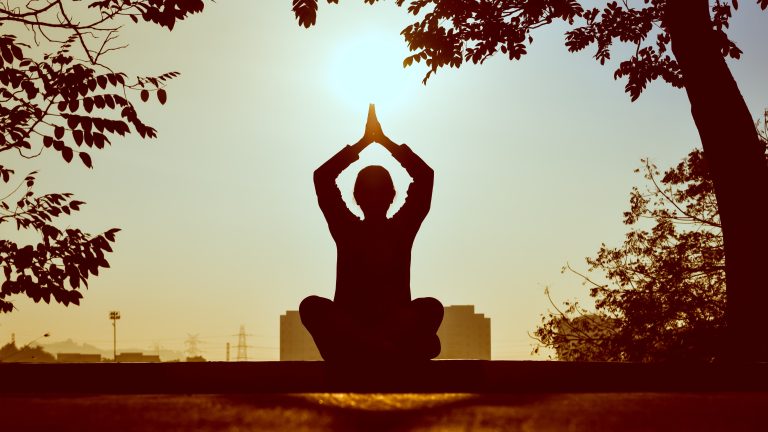During the day, we tend to be distracted by work and chores at home. But as the day ends and bedtime approaches, we become increasingly aware of all the thoughts running across our minds. Jumping onto this “overthinking” bandwagon often leads to interference with sleep and a situation that we have all been familiar with at some point: tossing and turning in bed.
Enter sleep meditation. Meditation for sleep involves indulging in a peaceful practice before bed that induces sleep. Imagine letting go of everything said and done, resting your mind and eventually resting the body and getting some deep sleep. If you’ve been experiencing trouble falling asleep and are looking for a natural remedy, keep reading. By the end of this article, you’ll learn everything about what is sleep meditation, how it can benefit you and how you can do it from the comfort of your bed. Ready? Let’s begin!
Benefits of Meditation before Sleeping
By indulging in a relaxing meditative routine before bed, you can help release the day’s stress and the mind’s worries. And that’s not all. Here are more ways in which sleep meditation can benefit you:
By increasing melatonin and serotonin and reducing heart rate and blood pressure, meditation impacts your body in ways that enable you to get restful sleep. It improves your relaxation response and initiates physiological changes. Especially helpful for those experiencing symptoms of insomnia, meditation can improve the quality and efficiency of sleep and how quickly you fall asleep. Once asleep, you are likely to sleep more soundly too.
A good night’s sleep has positive effects on our day ahead. When you’ve slept well, you experience less stress and improved mental clarity and memory. Your eating habits improve, and so does your immune system. In fact, research has also linked better sleep to reduced risk of Alzheimer’s.
On the other hand, sleep deprivation makes people susceptible to making more errors at work and driving more dangerously on the road. It also increases the risk of developing chronic diseases such as diabetes, unhealthy eating habits and heart disease.
So, if you’re looking for a natural way to sleep better and faster, meditation can help. Not only will you improve your sleep patterns but your overall health and well-being too.
How to do Sleep Meditation?
Here is a simple step-by-step breakdown of how to engage in sleep meditation:
The first step is to lie flat on your back in the comfort of your bed. Be relaxed. Feel free to use your blankets and pillows to feel warm and cosy.
- Slowly close your eyes and take deep breaths. Inhale slowly and deeply through your nose. Hold your breath for a few seconds. Slowly exhale through your mouth, releasing all tension and stress.
- Indulge in such deep, slow breathing for some more time. Focus on your body and how it feels with every inhale and exhale. Imagine breathing in peace and calm and exhaling stress and worry.
- While focusing on breathing, you can also picture yourself in a tranquil scenario. Think of a place and time that instantly helps you feel better and calmer. It could be a peaceful forest, an empty beach or a hilltop. Imagine the sounds, visualise the scene and use all your senses to bring it to life.
- Let go of any distractions. Notice your mind has wandered? No problem. Slowly begin to refocus on your breath and your visualisation. Practice this meditation for 10 to 15 minutes or as long as you wish until you can drift off.

Meet your Happiness Goals on Happily
Our Relevant Products
Feel Calm
Feel Motivated
Mindful Relationships
Personal Growth
Brtter Sleep
Slowing Down
and many more...
It’s important to remember that in the beginning, your mind will wander and you will find it difficult to quieten your thoughts. And that’s okay. The overall goal is to feel relaxed and relieve tension before you sleep. Be kind, soft and gentle with yourself, and don’t try to force sleep. Allow it to come to you. With practice, patience and persistence, you’ll be able to harness the power of sleep meditation to sleep faster and wake up feeling refreshed.
Guided Sleep Meditation
For those new to meditation, guided sleep meditation can be super helpful! This meditation style is designed to help you relax and fall asleep with the help of a teacher and doesn’t need any prior practice or training. All you need is a device or medium that plays a soothing voice recording for you – these are available online via apps, podcasts and free videos.
Now, there are plenty of guided sleep meditations – each with its own style and approach. If you have trouble quieting the mind, such techniques can be helpful as it gives you something interesting to focus on. Let’s take a closer look at some of them.
1. Meditation Stories
Meditation stories or visualisation meditation is an engaging technique – perfect for beginners! The goal is to immerse yourself in a storyline and imagine you are there. As the story progresses, it takes you on an imaginative and creative journey in your mind – one that makes you feel at peace and lulls you to sleep.
2. Sound Meditation
Relaxing sounds (such as chants) and soothing music can also help guide your meditation journey. The sounds’ therapeutic effect and pacifying nature make you easily drift off to sleep.
3. Breathing Exercises
Yes, breathing exercises can also be a form of guided meditation! One popular way to focus on breathing is following the 4-7-8 breath count. Inhale for four counts, hold your breath for seven and exhale for eight counts. It eventually helps slow down your breath and signals your body that it’s time to sleep.
4. Body Scanning or Yog Nidra
Mindful body scanning or Yog Nidra is where a narrator/meditation teacher asks you to mentally examine your body – starting from your toes and going up to the head. As you scan through, you’re asked to notice all the feelings, tension and sensation in each body part. Yog Nidra slowly draws you into a state of restful being. The slow relaxing and unclenching of the muscles can put your body (and mind) at ease, eventually leading to a peaceful slumber. If you struggle with letting go and find it hard to slow down and relax, try Yog Nidra. It integrates well-being, restoration and effortless relaxation.
5. Gratitude Meditation
Often referred to as appreciation meditation or loving-kindness meditation, this style focuses on gratitude. If you prefer ending your day on a wholesome and positive note where you’re thankful and appreciative of all the good things in life, this style is for you.
When embarking on your guided meditation journey, keep an open mind. It may take a couple of tries to find a meditation technique that works, so be patient and trust the process. With time, you’ll notice how sleep meditation will become an integral part of your unwinding routine.
Download the app today!
Deep Sleep Meditation
Once you have utilised meditation to conquer your insomnia, you can aim for deep sleep. You see when we sleep, we pass through different stages and cycles. Deep sleep is that stage where our heart rate, breathing and brain waves are at their slowest. At this stage, even loud noises may not wake you up immediately. Deep sleep is beneficial for the body in several ways. When you get adequate deep sleep every night, you restore energy to your mind and body, face reduced risk of chronic diseases and have better mental health.
You can experience deep sleep meditation through meditation and lifestyle changes such as regular exercise, yoga, avoiding alcohol before bed and being consistent with your sleep schedule.
So there you go! That covers everything you need to know about sleep meditation and how you can use the power of this simple technique to gain deeper, restful sleep. Instead of doom-scrolling on social media or binge-watching a TV show, why not try meditation? Whether battling insomnia or anxiety or simply aiming for better quality sleep, adding meditation to your daily routine can make a significant difference.
Sweet dreams!






